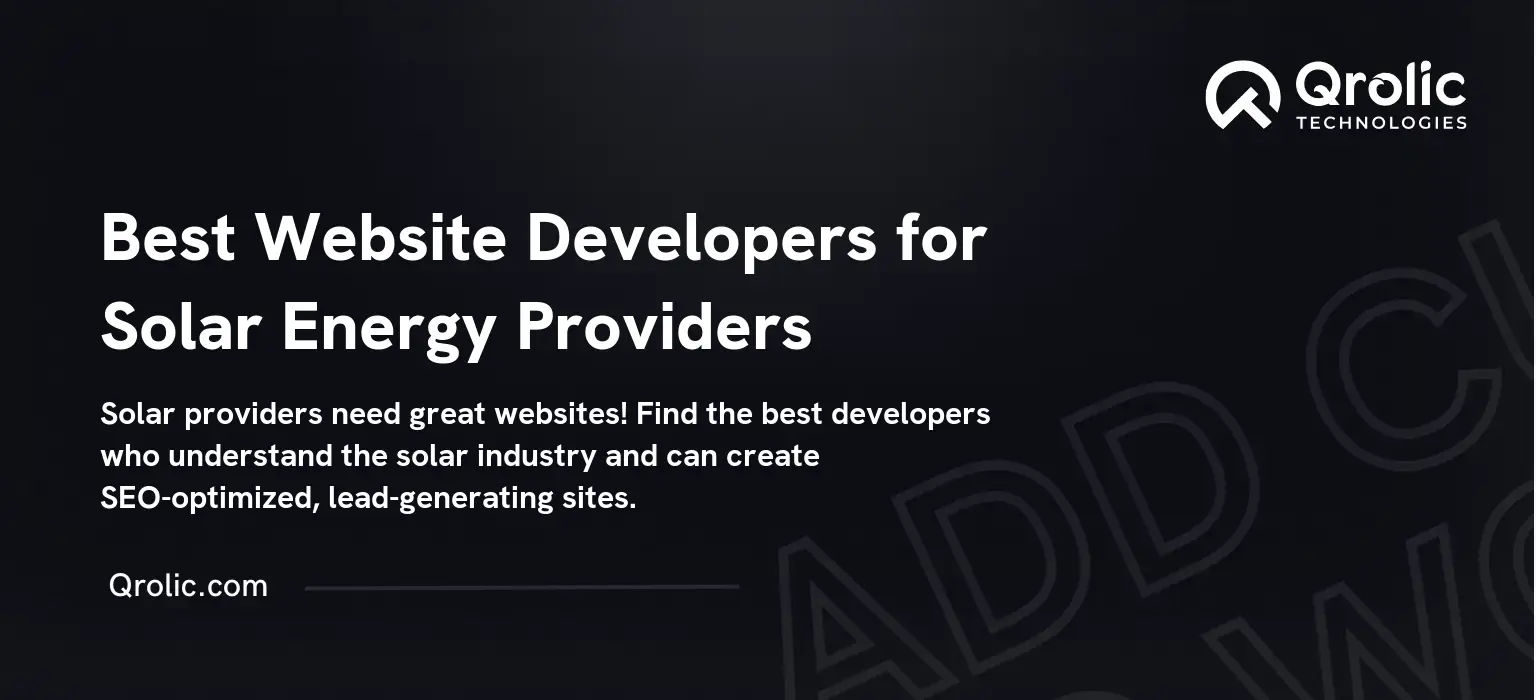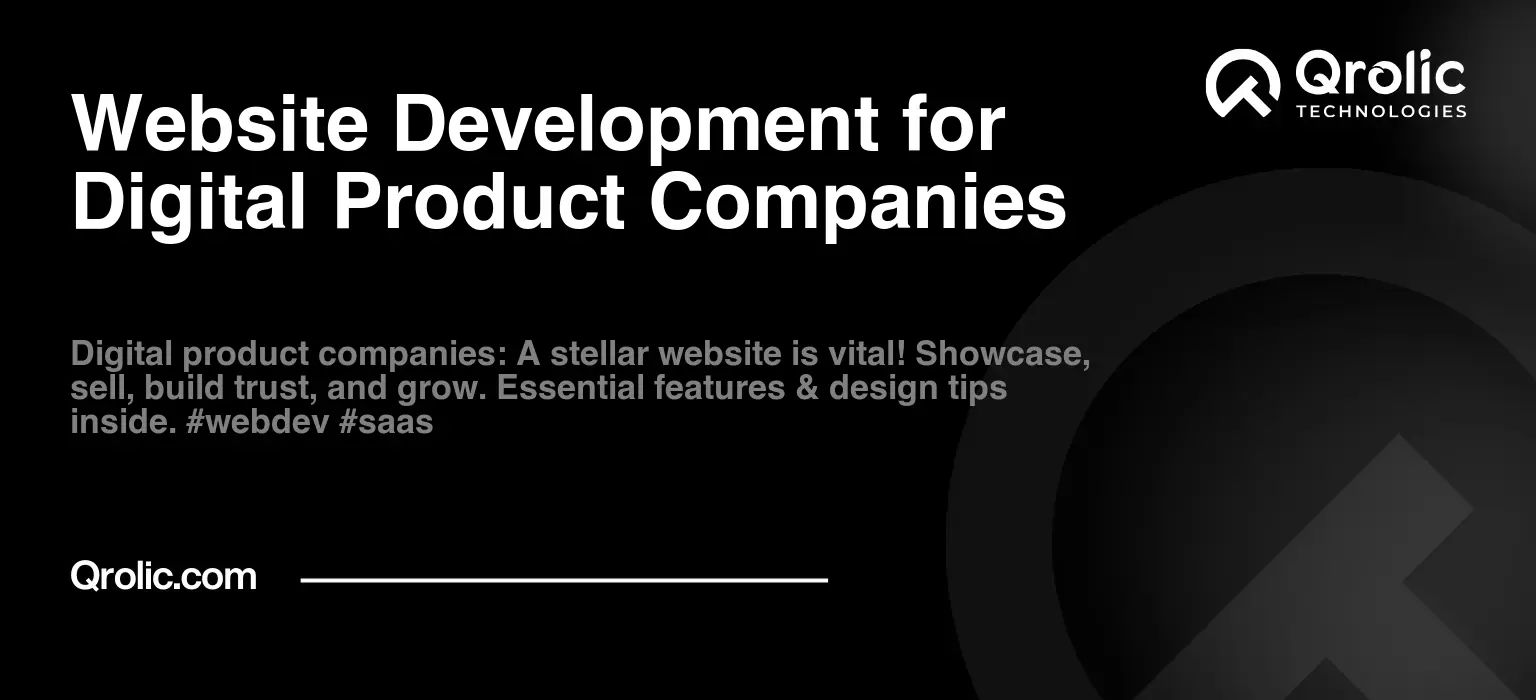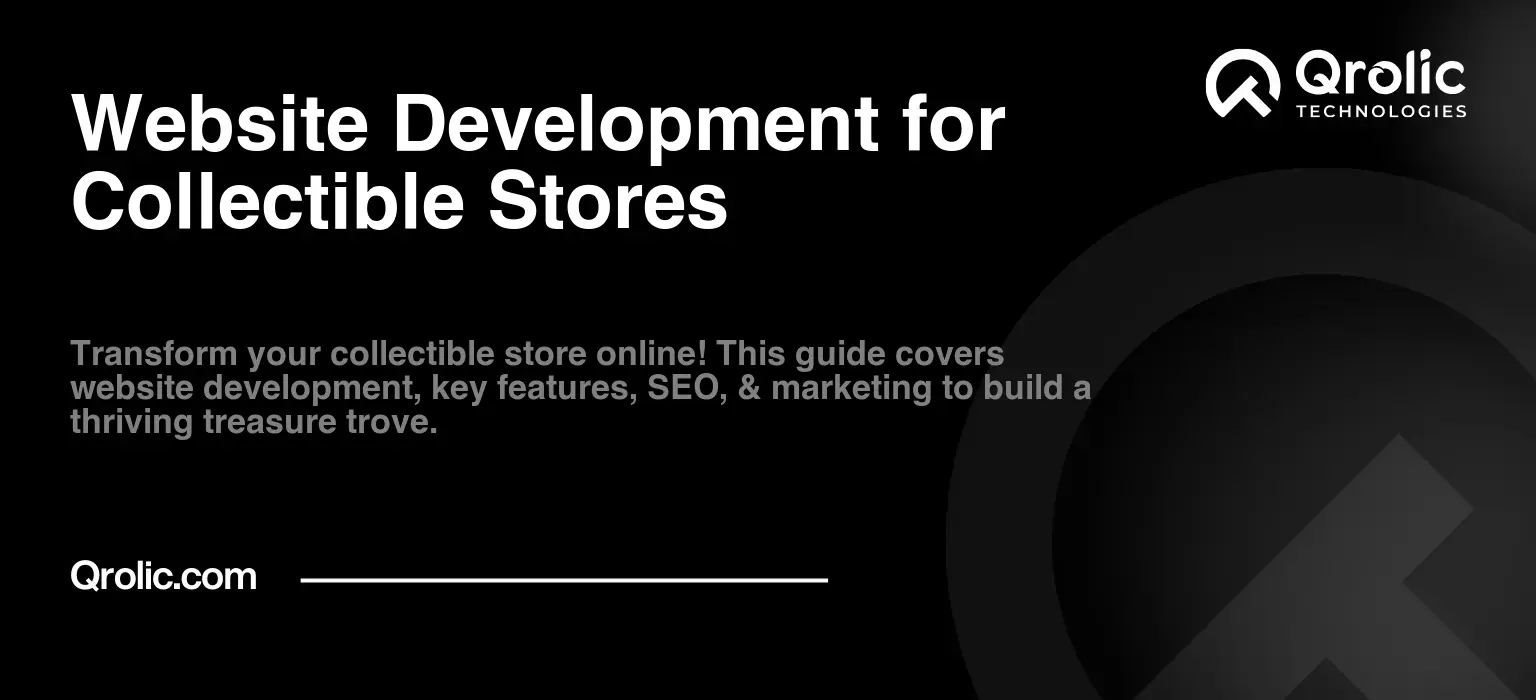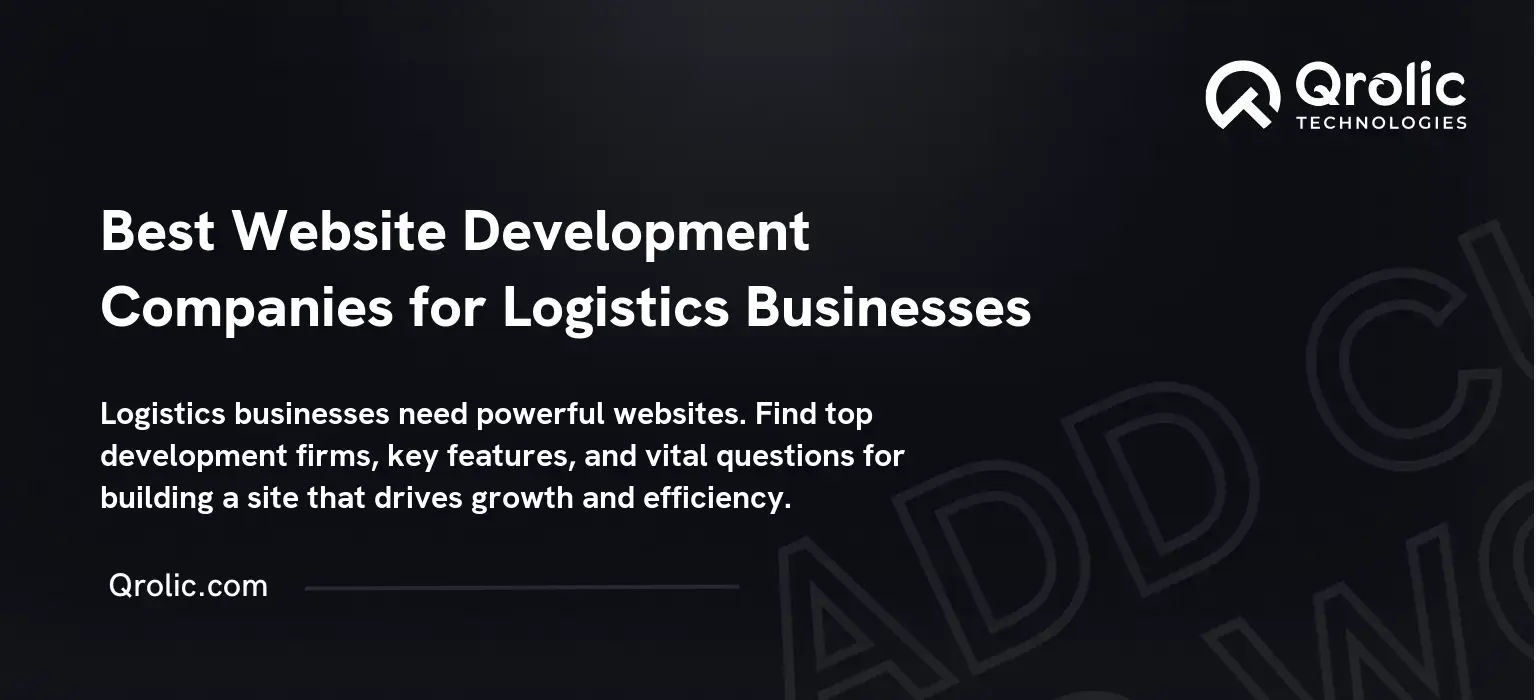Quick Summary:
- A strong, mobile-friendly website is essential for solar businesses.
- Choose developers with solar industry knowledge and SEO expertise.
- Ensure your solar website includes key features like portfolios and calculators.
Table of Contents
Best Website Developers for Solar Energy Providers
The Power of a Strong Online Presence for Solar Businesses
In today’s digital landscape, a robust online presence is no longer optional – it’s essential, especially for solar energy providers. Your website is often the first point of contact for potential customers, a digital storefront that either attracts or repels. A poorly designed site can silently turn away leads, while a well-crafted one acts as a powerful magnet, drawing in prospects and converting them into loyal clients. For businesses thriving on innovation and sustainability, your website should mirror that ethos.
Why is a Good Website Crucial for Solar Providers?
- First Impressions Matter: Your website is often the first glimpse potential customers have of your business. A professional, well-designed site conveys credibility, expertise, and trustworthiness.
- Showcase Your Portfolio: A dedicated space to display your completed solar projects, highlighting their scale and complexity, builds confidence in your abilities. Visuals are vital; before and after images, testimonials, and case studies help potential clients visualize the benefits.
- Educate and Inform: Many people are still unsure about solar energy. Your website can serve as an educational hub, explaining the benefits, different panel types, government incentives, and the overall installation process. An informed customer is more likely to invest.
- Generate Leads: Strategically placed contact forms, quote requests, and call-to-action buttons can effectively capture leads and initiate the sales process.
- Establish Brand Authority: A consistent brand message, professional design, and valuable content build your authority within the solar industry, setting you apart from the competition.
- Enhance Customer Experience: A user-friendly website makes it easy for customers to find the information they need, schedule consultations, and track their project status, significantly improving the overall experience.
- Mobile-First Approach: With the majority of internet users accessing the web through mobile devices, your website needs to be fully responsive and optimized for mobile viewing, providing a seamless experience across all platforms.
- SEO Optimization: A well-optimized website ensures your business appears higher in search engine results, increasing your online visibility and attracting organic traffic.
What to Look For in a Solar Website Developer
Choosing the right Web Development partner is crucial for the success of your solar business. You need a team that not only understands web development principles, but also grasps the nuances of the solar industry. Here are the key attributes to seek:
1. Industry Experience and Understanding:
- Solar-Specific Knowledge: Look for developers with a track record of working with solar energy companies. They will be familiar with industry-specific terminology, challenges, and customer expectations. They need to understand the nuances of solar provider website design.
- Understanding of Renewable Energy Web Development: Developers should be aware of the growing trend toward sustainability and the specific features that are crucial for a renewable energy company’s website, including showcasing environmental impact and compliance certifications.
- Familiarity with Incentives: Developers should understand federal, state, and local solar incentives, enabling them to create content that informs and attracts customers looking to take advantage of these programs.
- Understanding User Needs: A quality developer knows your target audience – homeowners, business owners, government agencies – and designs websites with their needs in mind.
2. Design and Functionality Expertise:
- Clean and Professional Design: The website should be visually appealing, easy to navigate, and reflect your brand’s identity.
- Mobile-Friendly Responsiveness: A responsive design that adapts to all devices (desktops, tablets, and smartphones) is non-negotiable.
- Fast Loading Speeds: Page load speed is critical for user experience and SEO rankings. Developers should optimize images and code for optimal performance.
- Intuitive User Experience (UX): The website should be easy to navigate, with clear call-to-actions and well-organized content.
- Interactive Elements: Use of animations, videos, and interactive maps can significantly improve engagement and keep visitors on your site longer.
3. SEO Expertise:
- Keyword Research: The developer should conduct keyword research to identify the terms potential customers use when searching for solar solutions. Solar panel web designers should incorporate these into site copy and meta-data.
- On-Page Optimization: Proper use of headings, meta descriptions, alt text, and internal linking are crucial for on-page SEO.
- Off-Page Optimization: The developer should implement off-page SEO strategies such as directory submissions and building high-quality backlinks to enhance the website’s domain authority.
- Technical SEO: The website should be optimized for search engines, including XML sitemaps, structured data markup, and schema markup to help search engines understand the content and context of the website.
4. Content Strategy and Creation:
- Content Planning: Developers should work with you to plan a content strategy that aligns with your business goals and target audience.
- Clear and Engaging Copy: The content should be well-written, informative, and persuasive. Developers can work with copywriters experienced in the solar industry.
- Blog Management: A regularly updated blog can provide valuable content, attract organic traffic, and establish you as an industry leader.
- Multimedia Content: Integrating images, videos, infographics, and other multimedia elements enhances the website’s appeal.
5. Technical Skills and Support:
- Programming Languages and Frameworks: Developers should be proficient in HTML, CSS, JavaScript, and relevant server-side languages and frameworks, depending on your website’s needs.
- Content Management Systems (CMS): Experience with user-friendly CMS platforms like wordpress, Drupal, or Joomla is essential.
- Integration with CRM and Marketing Tools: Your website should seamlessly integrate with your existing CRM, email marketing, and other essential business tools.
- Security: Proper security measures should be implemented to protect your website and customer data.
- Ongoing Support and Maintenance: A reliable development team should provide ongoing support, maintenance, and updates to keep your website running smoothly.
6. Communication and Collaboration:
- Transparency and Regular Updates: The development team should keep you informed throughout the process, providing regular updates on progress.
- Active Listening: They should be good listeners and understand your business goals and vision.
- Proactive Approach: They should proactively offer suggestions and solutions to improve your website.
Essential Features for a Solar Provider Website
Beyond the core elements of a professional website, certain features are particularly beneficial for solar energy businesses:
- Project Portfolio: A visual gallery of completed solar installations with project details, including system size, location, customer type, and performance data. Include high-quality photos and potentially videos.
- Customer Testimonials and Reviews: Social proof in the form of satisfied customer testimonials builds credibility and trust. Consider using video testimonials for greater impact.
- Solar Calculator or Savings Estimator: An interactive tool allows potential clients to estimate their potential savings with solar, making it easy for them to understand the benefits.
- Service Area Map: A clearly defined map of your service area ensures that you attract qualified leads within your reach.
- Financing Options: Highlight financing options available for solar installations to make it more accessible to customers. Information on rebates and tax incentives can also be beneficial.
- Frequently Asked Questions (FAQ): Address common questions about solar energy and installation processes to educate potential clients and build trust.
- Contact Forms and Call-to-Actions: Strategically placed contact forms and call-to-action buttons to encourage visitors to get in touch.
- Blog: A blog that addresses industry trends, updates in solar technology, government incentives, and sustainability news.
- Live Chat Function: Instant communication is key. Live chat can help answer queries immediately and push customers closer to conversions.
- Integration with Social Media: Links to your social media profiles will expand your reach and make it easy for customers to stay connected.
- Solar Panel Monitoring Capabilities: If you offer system monitoring, consider a portal for customers to track system performance and production.
- Case Studies: Detailed reports of specific projects that demonstrate your experience, expertise, and success.
- Team Page: Showcase the experience of your team. Highlight certifications and qualifications to establish trust and authority.
- Resource Library: Providing access to industry reports, research, and ebooks demonstrates your commitment to education and establishes you as a leader in the solar field.
SEO Strategies for Solar Energy Websites
To ensure your solar business website gets the visibility it deserves, a robust SEO strategy is crucial. Here are some effective techniques:
1. Keyword Research:
- Identify Relevant Keywords: Use keyword research tools to discover terms and phrases your target audience uses to search for solar solutions, focusing on solar provider website design, renewable energy web development, and solar panel web designers.
- Long-Tail Keywords: Target long-tail keywords that are more specific and niche-focused, such as “best solar panels for residential homes in [city]” or “solar panel installation for commercial buildings”.
- Local Keywords: Focus on local keywords, using your city and region to improve visibility in your geographic area.
2. On-Page Optimization:
- Optimize Meta Descriptions and Titles: Create compelling meta descriptions and titles for each page to improve click-through rates from search results.
- Use Headings and Subheadings: Structure content with proper use of headings (H1, H2, H3, etc.) to help search engines understand the content’s hierarchy.
- Optimize Images: Use relevant file names and alt text for all images, describing what they depict.
- Internal Linking: Link to relevant pages within your site to improve navigation and distribute link equity.
- Mobile-Friendliness: Ensure your site is mobile-friendly, as Google prioritizes mobile-first indexing.
- Page Speed Optimization: Optimize images, minimize code, and leverage browser caching to improve page loading speed.
3. Off-Page Optimization:
- Backlink Building: Build high-quality backlinks from reputable websites within the industry and local directories.
- Directory Submissions: Submit your website to relevant local and industry-specific online directories.
- Guest Blogging: Contribute guest posts to reputable websites to reach a wider audience and build authority.
- Social Media Marketing: Share your content and engage with your audience on social media platforms.
4. Local SEO:
- Google My Business Optimization: Claim and optimize your Google My Business profile to increase visibility in local search results.
- NAP Consistency: Maintain consistent Name, Address, and Phone number (NAP) across your website and other online listings.
- Local Citations: List your business on local online directories and review sites.
5. Content Marketing:
- Create High-Quality Content: Produce valuable, informative, and engaging content, including blog posts, videos, infographics, and case studies.
- Regularly Update Content: Regularly publish fresh content to keep your website relevant and attract search engine crawlers.
- Share on Social Media: Promote your content through social media channels to expand your reach.
6. Technical SEO:
- XML Sitemap: Create an XML sitemap to help search engines crawl and index your website more effectively.
- Schema Markup: Use schema markup to help search engines understand the context of your content and provide richer search results.
- Robots.txt File: Create a robots.txt file to control which parts of your website search engines can access.
- Website Security: Protect your website with an SSL certificate and implement proper security measures.
By implementing these SEO strategies, solar energy providers can significantly improve their online visibility, attract qualified leads, and establish themselves as leaders in the industry.
Choosing the Right Partner: Why Qrolic Technologies
When you’re looking for a web development partner that truly understands the solar energy industry, consider Qrolic Technologies (https://qrolic.com/). Qrolic brings a wealth of experience, expertise, and dedication to every project, ensuring that your website becomes a powerful tool for business growth.
Why Qrolic Technologies Stands Out:
- Deep Understanding of the Solar Industry: Qrolic isn’t just a web development company; they have a proven track record of working with renewable energy companies and have a deep understanding of the industry-specific needs of solar businesses, ensuring that they design websites that are not just aesthetically pleasing but also fully functional for your needs. Qrolic understands solar provider website design and renewable energy web development.
- Customized Solutions: Qrolic takes a collaborative approach to create custom-tailored websites that reflect your brand identity, meet your specific needs, and align with your business goals. They don’t offer one-size-fits-all solutions; instead, they craft a unique digital experience for your customers.
- Experienced Team: Their team comprises seasoned web developers, designers, and digital marketing experts who are passionate about crafting exceptional digital solutions.
- Focus on User Experience (UX): Qrolic emphasizes creating user-friendly websites that are easy to navigate, visually appealing, and optimized for conversion. They focus on providing seamless navigation, clear calls-to-action, and fast loading times for all devices.
- Mobile-First Approach: They understand the importance of mobile-first development and ensure that every website they create is fully responsive and optimized for mobile viewing.
- SEO-Driven Development: Qrolic understands that a beautiful website is worthless if it can’t be found. They integrate SEO best practices throughout the development process, including thorough keyword research and on-page optimization, allowing you to rank higher in search engine results. They are well versed in the skills of solar panel web designers.
- Ongoing Support and Maintenance: Qrolic doesn’t disappear after launching your site. They provide ongoing support and maintenance to ensure your website is running smoothly, including regular updates and backups.
- Transparent Communication: They keep you informed throughout the development process, providing regular updates and seeking your feedback.
- Proven Results: Qrolic has a track record of delivering results for clients across different industries, helping businesses increase their online presence and generate more leads.
- Commitment to Innovation: They are committed to staying ahead of the curve by adopting the latest technologies and trends.
- Comprehensive Service Range: Qrolic also has a wide array of digital marketing services, including SEO, content marketing, social media marketing, and more, making them a one-stop shop for your online needs.
By partnering with Qrolic Technologies, solar energy providers can be confident that their website will be a powerful tool for attracting new customers, building brand awareness, and achieving their business goals. Their team’s deep expertise in web design and development, particularly for the solar industry, positions them as an ideal partner for any solar energy business seeking to establish a strong online presence.












